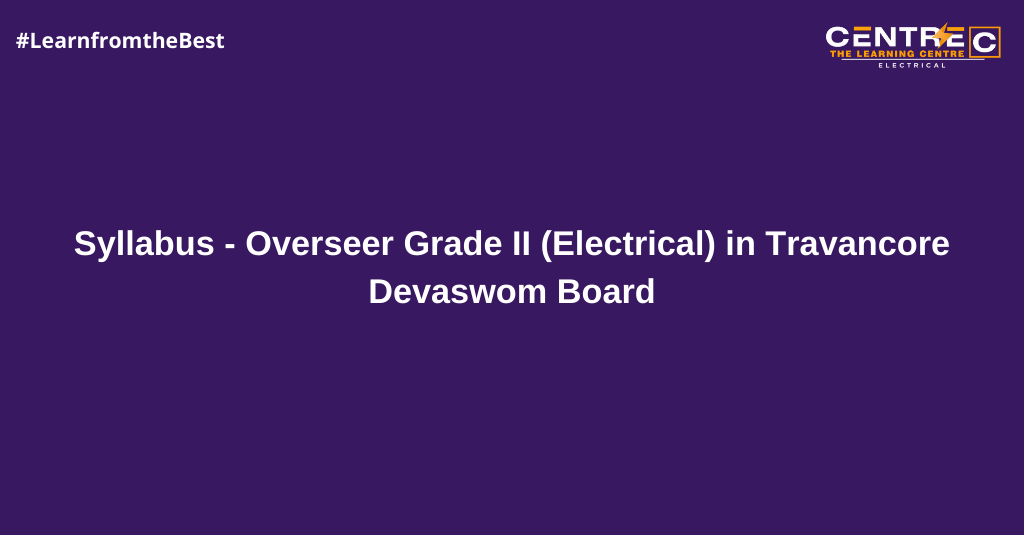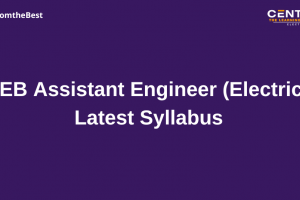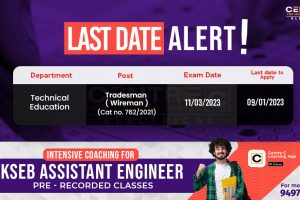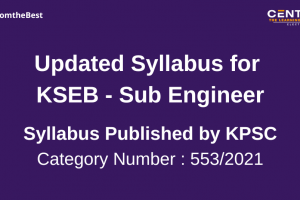
Overseer Grade II (Electrical) Syllabus in Travancore Devaswom Board
Detailed Syllabus for Overseer Grade II (Electrical) in Travancore Devaswom Board
(Cat. No. : 05/2022)
Overseer Grade II (Electrical) Mode of Examination and Syllabus
Name of Post : Overseer Grade II (Electrical)
Name of Devaswom : Travancore Devaswom Board
Category Number : 05/2022
Duration of the test : 1 hour 15 minutes
Medium of Questions : English
Mode of test : Objective type (Multiple choice) Test (OMR Valuation)
Total Questions : 100
Total Marks : 100
Overseer Grade II (Electrical) Syllabus – Main Topics
Part I – General knowledge, Current affairs and Renaissance in Kerala
Part II – Questions based on the Educational Qualifications prescribed for the post
Part III – Temple Affairs, Hindu Culture, Customs and Traditions, Various Devaswom Boards etc.
Overseer Grade II – Detailed Syllabus based on the main topics
Part I
General Knowledge, Current Affairs and Kerala Renaissance
(Marks – 10)
- Current International, National, Regional events & Achievements in the field of Politics, Science and Technology, Arts, Literature, Education, Space exploration, Sports and Cinema.
- Constitution of India – Preamble. Constituent Assembly. Important features of Indian Constitution. Procedure for amendment to Constitution. Important Constitutional amendments and it’s purpose. Central State relations. Principles of Secularism. Rights and duties of Citizenship. Judiciary – Central and State – Powers and Functions. Administration of Union Territories. Constitutional Authorities. Administrative and Financial Service under Union and State Government.
- 125 years of Gandhi legacy. Making of Mahatma. Philosophy of Mahatma. Role of Mahatma in the Freedom Movement. Political, Economical & Social ideas of Mahatma Gandhi. Gandhiji’s vision of peace. Gandhiyan interventions – Quit India Movement, Salt Sathyagraha. Fight against Castism, untouchability and Communal intolerance.
- Public Administration. Bureaucracy – Features and Functions. Executive, Judiciary and Legislature. Indian Civil Service. State Civil Service – State Administrative Service, Information Commissions – Central & State. Lokpal. Lokayuktha. Human Rights – Central and State Human Rights Commissions – Functions. Acts and Rules regarding Consumer Protection. District Administration – District Collectors. Office of the Advocate General. Various Tribunals and Commissions, Boards and Corporations.
- State and Union Territories in India, Geographical features. Climate, natural vegetation. Principal Crops. Important river systems. Key industries. Various Tourist Hotspots. Great Islands of India.
- Indian Economy. National Income. Per Capita Income. Economic planning in India. Niti Ayog. Economic institutions of National Eminence – Functions. Reserve Bank. Public Revenue. State and Central Budget. Goods and Service Tax. GST Council Structure. Central Board of Indirect Taxes and Customs.
- Environmental challenges. Climate changes. Ocean warming. Need to re-design the path of Economic and Industrial growth. Natural farming. Use of Environmental Energy. International/National Organizations, Government organizations and Agencies working for the protection and betterment of nature. Important Environmental Acts and Rules in India. Internationally acclaimed Environmentalists – their contributions. Important International agreements on conservation of protection of nature. World Climate Summit.
- Social welfare, Social security and Social development, Legislations and Programmes of Central and State Governments. Social Service Legislations like Right to Information Act, Prevention of attrocities against Women and Children, Food Security Act etc., Social Welfare Programmes like Employment Guarantee Programme, Organ and Blood Donation etc.
- Kerala Renaissance – Sree Narayana Guru and other reformers. Anticaste movement. Other Reform movements in Kerala. Caste organizations. Temple Entry movements. Nationalist movements in Kerala. Malabar Rebellion of 1921.
- Nature of the Revolt. Salt Satyagraha. Travancore State Congress and the Struggle for Responsible Government. Kochi Rajya Praja mandalam. Left movements. Karshaka Sangham in Malabar. Punnapra Vayalar. Aikya Kerala Movement – First Communist Ministry, Historic Legislations – Liberation Movements. First Communist Ministry – Historic legislations. ‘Kerala Model’ Development. Panchayat Raj and Peoples Planning. Democratic decentralization in India especially in Kerala.

Part II
Syllabus based on the Educational Qualification
(Total Marks : 80)
Electrical Machines – 10 Marks
- DC machines – generator types, construction, emf equation, windings, characteristics of armature reaction, commutation, trouble shooting and applications.
- DC motor – voltage equation, speed and torque, starting methods and speed control, starters
- Transformer – single phase and three phase- equivalent circuits, phasor diagrams, tests, regulation and efficiency, connections, parallel operation, auto transformer.
- Induction motor – squirrel cage and slip ring, principle and operation, slip, rotor current, frequency and rotor emf, torque equation, maximum torque, characteristics, power stages, equivalent circuits, speed control, starting methods, starters and applications.
- Synchronous generator – construction, salient pole& non salient pole, excitation methods, emf equation, armature reaction, armature reactance, leakage reactance, circle diagram, vector diagram, voltage regulation, cooling system.
- Synchronous motor- methods of starting, characteristics, phasor diagram, hunting, applications
Power systems – I and II – 10 Marks
- Power systems – I (Power Generation, Transmission & Distribution)
- Power generation – types- hydel, thermal, nuclear, layout, site selection, comparison of different generation system- conventional & non-conventional, renewable power plants.
- Transmission – line constants, line insulators, string efficiency, sag, skin effect, corona and Ferranti effect, DC transmission system.
- Distribution system –overhead, radial, ring and interconnected.
- Power systems – II ( Protection & Utilization)
- Protection – primary and secondary, fuses, terms and definitions, types,
- Circuit breaker – principle, operation and types. Protection of alternator, transmission line and neutral earthing.
- Utilization – electric heating, materials, advantages, types devices.
- Electric welding – principle and types.
- Traction –terms, definitions, speed time characteristics, tractive effort,
- efficiency. Electric breaking – methods, advantages, applications.
Measurements & Instruments – 10 Marks
- Electrical measuring instruments – function, terms and definitions. Principle of operation , construction and application. Instruments used for voltage, current, power, power factor, frequency, and energy measurements.
- Digital instruments – digital voltmeter, multimeter and CRO, wave analyzer.
- Transducers and gauges – semiconductor strain gauge, LVDT, burden tube, capacitor transducer, piezo electric transducer, bellows.
Estimating – 10 Marks
- Electrical wiring- types, accessories, earthing. Illumination – terms and definition, laws of illumination, lighting schemes, design and calculations.
- Bus bar design, industrial electrification.
- Lamps- types, construction, working and application.
- IS code and IE rule.
Electronics – 10 Marks
- Diode – characteristics, configuration and application. Transistor – characteristics, configuration and application, equivalent circuits, hparameters. Amplifier – classification, working, circuit diagram, application.
- Oscillator – feedback, Barthusins’s criteria, types. Multifibrats- types, circuit diagram and applications.
- Operational amplifier – working, characteristics and applications
Digital electronics – 10 Marks
- Number system- conversion of decimal, octal, binary and hexa decimal and vice versa. Binary addition, subtraction and division, BCD addition, 1’s complement, 2’s complement. Logic gates – basic logic gates, truth table,
- Boolean algebra, axioms and postulates, universal logic gates. K –map, De Morgan’s theorem, half adder, full adder, multiplexing and de multiplexing, Flip flop- circuit, clocked flip.
- Microprocessor – features of 8085 MP , block diagram, architecture, register structure, application.
Power electronics and Microcontroller & PLC – 10 Marks
- UJT, FET, Diac, Triac, SCR- principle, construction, operation and characteristics, applications.
- Electric drives- DC drives, single phase, semi converter, full converter and dual converter drives.
- Speed control of three phase induction motor, stator control, voltage and frequency control.
- Converter circuits – inverter, chopper, classifications.
- Microcontroller & PLC
- 8051 microcontroller- features block diagram, architecture, register structure, special function register, internal and external memory, pin details, ports, counters and timers, serial I/O, associated registers, interrupts. Application
- PLC- block diagram, operation, types, programming methods, ladder diagram, applications.
Part III
Temple Affairs, Hindu culture, Customs and Traditions, Various Devaswom Boards etc.
(Total Marks : 10)
- Temple Affairs. Famous Temples in Kerala – Deities, Peculiarities, Location. Temple Festivals.
- Special ceremonial and devotional functions in temples – It’s importance and Social relevance. Temple Arts. Famous Temple Artists.
- Temple Architecture in Kerala – It’s peculiarities and ethnic importance. Great Spiritual leaders, Saints, Thinkers and Philosophers in Hinduism – Their contributions.
- Holy books of Hinduism – Vedas, Puranas and Upanishads – Basic knowledge. Concept of Devaswoms. History of temples in Kerala. Events that lead to the formation of Devaswoms.
- Temple Entry Proclamation. Travancore-Cochin Hindu Religious Institutions Act 1950. Present day Administration of Temples in Kerala and Various Devaswom Boards.
- Kerala Devaswom Recruitment Board – Formation, powers and responsibilities – Hierarchial setup.
For Complete Syllabus;

CENTRE C ELECTRICAL SOCIAL MEDIA PLATFORMS
Our Social media platforms are exclusively for Electrical Engineering students, job candidates, teachers and all those who have passion for Electrical Engineering.
You will get
- Electrical engineering quiz
- Regular job notifications
- Exam notifications
- E – News
- E – Shots
- Study tips
- Electrical related discussion and all in this group.




